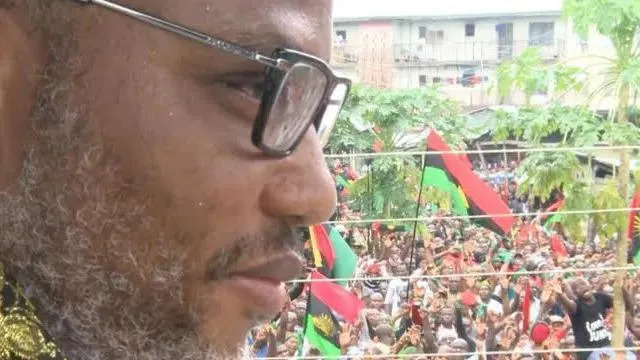Nnamdi Kanu Convicted of Terrorism After Years of Activism

A Nigerian court has found separatist leader Nnamdi Kanu guilty of terrorism, concluding a legal saga that began with his initial arrest in October 2015. The court determined that Kanu had engaged in a campaign to incite violence and killings in support of his quest for an independent state for the Igbo people, known as Biafra. This verdict marks a significant moment in Nigeria’s ongoing struggles related to regional separatism.
Kanu gained prominence in 2009 with the launch of Radio Biafra, a station that advocated for the independence of Biafra while broadcasting from London. Although he was raised in southeastern Nigeria and attended the University of Nsukka, Kanu moved to the United Kingdom before completing his studies and secured British nationality. In 2014, he founded the Indigenous People of Biafra (IPOB), a group that has since been designated as a terrorist organization by the Nigerian government in 2017. The group’s armed wing, the Eastern Security Network, has faced numerous accusations of violent acts in recent years.
During the verdict delivery, Judge James Omotosho stated, “Mr Kanu knew what he was doing; he was bent on carrying out these threats without consideration to his own people.” He emphasized that the evidence presented demonstrated Kanu’s involvement in preparatory acts of terrorism. Kanu had previously attempted to halt proceedings, claiming he had not been able to submit his final written address and alleging bias from the judge. His outburst led to his removal from the courtroom before the verdict was announced.
Kanu’s legal troubles began in earnest with his first arrest in 2015. He later jumped bail in 2017 following a military raid on his residence. After the court revoked his bail in March 2019, Kanu was apprehended again in 2021 in Kenya, leading to this recent conviction.
The aspirations for Biafran independence are deeply rooted in Nigeria’s history. In 1967, Igbo leaders declared a Biafran state, which was met with a brutal civil war that resulted in an estimated one million deaths. The rebellion ultimately failed, but calls for independence have persisted over the decades.
As Nigeria grapples with the implications of this verdict, the issue of Biafran independence remains a contentious topic, reflecting the complex interplay of ethnicity, identity, and national unity in the country.






